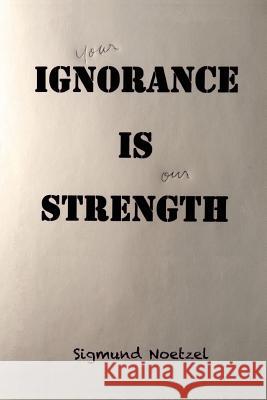your Ignorance Is our Strength: the Supreme Court Overrules Democracy » książka
your Ignorance Is our Strength: the Supreme Court Overrules Democracy
ISBN-13: 9780997571707 / Angielski / Miękka / 2016 / 182 str.
"your IGNORANCE IS our STRENGTH" is an discussion, in dialog form, among U.S. citizens trying to come to terms with the proposition, asserted by the Supreme Court --the government's absolute power-- A CORPORATION IS A PERSON.
The title is adapted from IGNORANCE IS STRENGTH --one of the slogans propagated by the secret Inner Party in Orwell's novel 1984. The others were WAR IS PEACE and FREEDOM IS SLAVERY. Nobody believed these slogans: they made no sense. But they could not be seen as utter nonsense, because their words --common, familiar words-- had been given new meanings. The Inner Party controlled the definitions of the words. With the altered definitions, the propositions were neither sensible nor reasonable, but they were impossible to refute. Arguments against propositions true by definition cannot gain traction. The Inner Party --the government's absolute power-- asserted that only it could properly understand their profound meanings, and it controlled the society though laws --edicts-- derived from them. Orwell understood how language is --has been and will be-- used as a tool of deception for political control. A power that can assert nonsense by changing the meanings of words can subdue and control a democratic society. In place of a fictional dystopia with imagined nonsensical propaganda, the book "your IGNORANCE IS our STRENGTH" presents the voices of citizens who demand to be shown the legitimacy of the proposition, asserted by their government's absolute power-- A CORPORATION IS A PERSON. And in the discussion, they find that It is not a law that has been passed by any legislature. The Supreme Court has asserted it to be a Constitutional principle, which it can use to overrule legislation. It is not a meaning of the original Constitution, or its Amendments, that was ever intended by any of its authors. Nor is it a meaning understood or accepted by any of the legislatures that ratified them. It's purported justification is found in the Fourteenth Amendment, passed, after the Civil War, to ensure the political rights of the emancipated slaves. That Amendment contains the clause ..". nor can any state deny any person equal protection of the laws." The Supreme Court announced --issued an edict-- that the word 'person' in this clause is defined to include corporations --so all laws must apply equally to human beings and corporations. The principle did not enter the law as a necessary rational for any Supreme Court decision. It was an announcement, not required by, discussed, or justified in any Supreme Court opinion. Its only logical foundation is known as the Fallacy of Composition.
“your IGNORANCE IS our STRENGTH” is an discussion, in dialog form, among U.S. citizens trying to come to terms with the proposition, asserted by the Supreme Court —the government’s absolute power— A CORPORATION IS A PERSON.
The title is adapted from IGNORANCE IS STRENGTH —one of the slogans propagated by the secret Inner Party in Orwell’s novel 1984. The others were WAR IS PEACE and FREEDOM IS SLAVERY. Nobody believed these slogans: they made no sense. But they could not be seen as utter nonsense, because their words —common, familiar words— had been given new meanings. The Inner Party controlled the definitions of the words. With the altered definitions, the propositions were neither sensible nor reasonable, but they were impossible to refute. Arguments against propositions true by definition cannot gain traction. The Inner Party —the government’s absolute power— asserted that only it could properly understand their profound meanings, and it controlled the society though laws —edicts— derived from them.Orwell understood how language is —has been and will be— used as a tool of deception for political control. A power that can assert nonsense by changing the meanings of words can subdue and control a democratic society.In place of a fictional dystopia with imagined nonsensical propaganda, the book “your IGNORANCE IS our STRENGTH” presents the voices of citizens who demand to be shown the legitimacy of the proposition, asserted by their government’s absolute power— A CORPORATION IS A PERSON. And in the discussion, they find that It is not a law that has been passed by any legislature. The Supreme Court has asserted it to be a Constitutional principle, which it can use to overrule legislation.It is not a meaning of the original Constitution, or its Amendments, that was ever intended by any of its authors. Nor is it a meaning understood or accepted by any of the legislatures that ratified them.It’s purported justification is found in the Fourteenth Amendment, passed, after the Civil War, to ensure the political rights of the emancipated slaves. That Amendment contains the clause “… nor can any state deny any person equal protection of the laws.” The Supreme Court announced —issued an edict— that the word ‘person’ in this clause is defined to include corporations —so all laws must apply equally to human beings and corporations.The principle did not enter the law as a necessary rational for any Supreme Court decision. It was an announcement, not required by, discussed, or justified in any Supreme Court opinion. Its only logical foundation is known as the Fallacy of Composition.











